 United and Verizon Airfone have become the first companies to receive Federal Aviation Administration (FAA) approval to install Wi-Fi for use on US domestic commercial aircraft.
United and Verizon Airfone have become the first companies to receive Federal Aviation Administration (FAA) approval to install Wi-Fi for use on US domestic commercial aircraft.
After extensive trials, approval was forthcoming after the two companies successfully demonstrated that using 802.11 b/g wireless technology within the cabin didn’t send the airplane into a loop-de-loop or spark off random explosions of Star Trek-esque white smoke.
 Although the FAA approval currently only applies to the cabin of United’s B757-200 aircraft, it’s an important landmark on the way to enabling full high-speed wireless Internet access on board all United aircraft.
Although the FAA approval currently only applies to the cabin of United’s B757-200 aircraft, it’s an important landmark on the way to enabling full high-speed wireless Internet access on board all United aircraft.
“Our research shows that connecting to the Internet is customers’ most preferred form of communication to the ground, and this certification is a crucial step to bring this inflight wireless access to our customers,” said Dennis Cary, United’s senior vice president-Marketing.
Verizon Airfone currently provides voice services and JetConnect(SM) Messaging services on United’s flights, and securing in-flight Wi-Fi Internet access is sure to be a coffer-filling money-spinner.
Verizon Airfone really had no option but to lead this initiative, someone was going to do it, and once done, all of Verizon Airfone’s high prices call revenue would be gone, as the Ilses started to run Skype on their laptops or PDA’s phones.
![]() “Our wireless broadband system will require only the addition of an avionics box, a wireless access point and a directional antenna, making it the faster and more affordable choice for United and its passengers,” said Bill Pallone, president, Verizon Airfone.
“Our wireless broadband system will require only the addition of an avionics box, a wireless access point and a directional antenna, making it the faster and more affordable choice for United and its passengers,” said Bill Pallone, president, Verizon Airfone.
Passengers desperate for some in-seat network fragging are going to have to wait on the Federal Communications Commission’s (FCC) scheduled “Air-to-Ground” spectrum auction to be held in the coming months. At the auction, providers will battle it out for lucrative service rights and the range of frequencies for onboard passenger access to the Internet.
 Once a service provider is selected by the FCC, United should be able to meet their passengers’ Wi-Fi needs in double quick time with, no doubt, zillions of other airlines following their lead.
Once a service provider is selected by the FCC, United should be able to meet their passengers’ Wi-Fi needs in double quick time with, no doubt, zillions of other airlines following their lead.
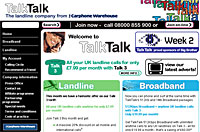 There’s a big battle going on for your landline, with the Carphone Warehouse limbering up to get in some telling punches into BT’s sector dominance.
There’s a big battle going on for your landline, with the Carphone Warehouse limbering up to get in some telling punches into BT’s sector dominance. Chief exec Charles Dunstone was ready with a quote: “We are now well on the way to developing a broad-based telecoms group, providing mobile and fixed line services to individuals and businesses across ten countries.”
Chief exec Charles Dunstone was ready with a quote: “We are now well on the way to developing a broad-based telecoms group, providing mobile and fixed line services to individuals and businesses across ten countries.”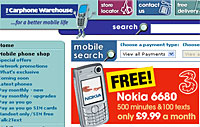 Crucially, revenues from telecoms services were up 45% to £804 million (~US$1,462m ~€1,190m), with operating profit flying up 50% to £22.5 million (~US$41m ~€33m).
Crucially, revenues from telecoms services were up 45% to £804 million (~US$1,462m ~€1,190m), with operating profit flying up 50% to £22.5 million (~US$41m ~€33m). The rumours have been floating around the Internet for weeks, but it now seems certain that Apple will announce later today that it will be switching its computers to Intel’s.
The rumours have been floating around the Internet for weeks, but it now seems certain that Apple will announce later today that it will be switching its computers to Intel’s. When asked about the deal he said that the company has long pursued a deal with Apple, adding, “We always talk to Apple. Apple is a design win that we’ve coveted for 20 years and we continue to covet them as a design win. We will never give up on Apple.”
When asked about the deal he said that the company has long pursued a deal with Apple, adding, “We always talk to Apple. Apple is a design win that we’ve coveted for 20 years and we continue to covet them as a design win. We will never give up on Apple.” Sales of laptops outstripped the number of desktop PCs for the first time ever, according to Current Analysis.
Sales of laptops outstripped the number of desktop PCs for the first time ever, according to Current Analysis.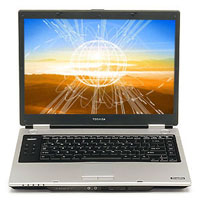 Once back-breaking beasts with a battery life measured in nano-seconds – and a price tag to make grown men weep – modern laptops are now faster, slimmer, more capable and, crucially, cheaper (laptop prices have fallen 17 per cent against a smaller 4 per cent fall for desktops).
Once back-breaking beasts with a battery life measured in nano-seconds – and a price tag to make grown men weep – modern laptops are now faster, slimmer, more capable and, crucially, cheaper (laptop prices have fallen 17 per cent against a smaller 4 per cent fall for desktops).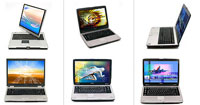 His barely-revelatory statement was backed up an announcement from Mike George, VP of consumer business for Dell US, who today revelaed that Dell will be launching a “luxury” range of computers, with their hoity-toity desktop and notebooks selling for between $1,200 (~£660, €979) and $3,500 (~£1,925, €2,855).
His barely-revelatory statement was backed up an announcement from Mike George, VP of consumer business for Dell US, who today revelaed that Dell will be launching a “luxury” range of computers, with their hoity-toity desktop and notebooks selling for between $1,200 (~£660, €979) and $3,500 (~£1,925, €2,855).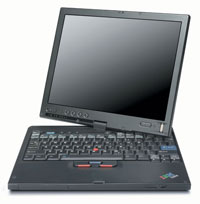 The Lenovo Group has officially announced the first ever ThinkPad tablet, the ThinkPad X41.
The Lenovo Group has officially announced the first ever ThinkPad tablet, the ThinkPad X41.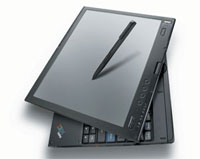 The growth of Tablet PCs – once described as the future of mobile computing by Microsoft – has so far been slow, with total sales only representing a tiny fraction of the PC market.
The growth of Tablet PCs – once described as the future of mobile computing by Microsoft – has so far been slow, with total sales only representing a tiny fraction of the PC market.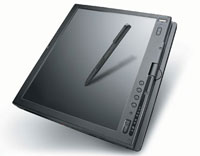 The anti-reflective and anti-glare screen claims to provide 170-degree viewing, and an optional integrated fingerprint reader offers extra security for the terminally paranoid and distrustful.
The anti-reflective and anti-glare screen claims to provide 170-degree viewing, and an optional integrated fingerprint reader offers extra security for the terminally paranoid and distrustful.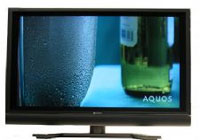 First shown off at the CEATEC show in Japan last year, Sharp has announced that it will be launching its gargantuan 65inch LCD set in August this year – the biggest in the world.
First shown off at the CEATEC show in Japan last year, Sharp has announced that it will be launching its gargantuan 65inch LCD set in August this year – the biggest in the world.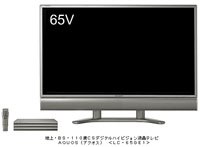 Monster LCD screens are prone to suffer from ‘smearing’, which results in onscreen artifacts being displayed by fast moving objects, but Sharp claims that its QS (Quick Shoot) Technology improves moving video responsiveness, making it perfect for watching high-speed full-motion video and fast moving footage (like a Cardiff City strike. Sort of).
Monster LCD screens are prone to suffer from ‘smearing’, which results in onscreen artifacts being displayed by fast moving objects, but Sharp claims that its QS (Quick Shoot) Technology improves moving video responsiveness, making it perfect for watching high-speed full-motion video and fast moving footage (like a Cardiff City strike. Sort of).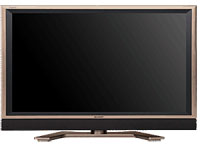 As is often the case lust-spawning objects, there’s a double whammy of a sting for anyone fancying installing one of these monolithic beasts in their Hackney bedsit.
As is often the case lust-spawning objects, there’s a double whammy of a sting for anyone fancying installing one of these monolithic beasts in their Hackney bedsit.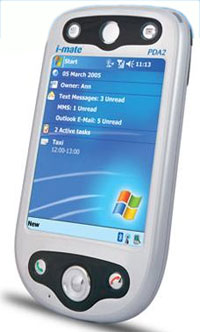 Dubai-based Microsoft Windows mobile specialists i-mate have added the HTC-manufactured i-mate PDA2 to their popular range of Pocket PC phones.
Dubai-based Microsoft Windows mobile specialists i-mate have added the HTC-manufactured i-mate PDA2 to their popular range of Pocket PC phones.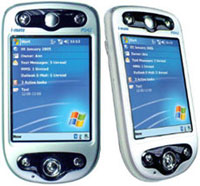 Memory can be expanded through a SD/MMC slot, also compatible with SDIO peripherals.
Memory can be expanded through a SD/MMC slot, also compatible with SDIO peripherals. Skype users can now gaze at each other’s ugly mugs (and other body parts) while they waffle online, thanks to a new free plug in from Dialcom.
Skype users can now gaze at each other’s ugly mugs (and other body parts) while they waffle online, thanks to a new free plug in from Dialcom. The deal for Webmasters is that Skype will dish out commissions of up to 10 per cent of its own store purchase revenues when a buyer is referred from their site.
The deal for Webmasters is that Skype will dish out commissions of up to 10 per cent of its own store purchase revenues when a buyer is referred from their site. Coming hot on the heels of their 3G Mobile TV launch, Orange France has announced that their high-speed EDGE mobile service for consumers will go live next week.
Coming hot on the heels of their 3G Mobile TV launch, Orange France has announced that their high-speed EDGE mobile service for consumers will go live next week. SFR expects to have scooped up around 500,000 3G subscribers by the end of the year.
SFR expects to have scooped up around 500,000 3G subscribers by the end of the year.